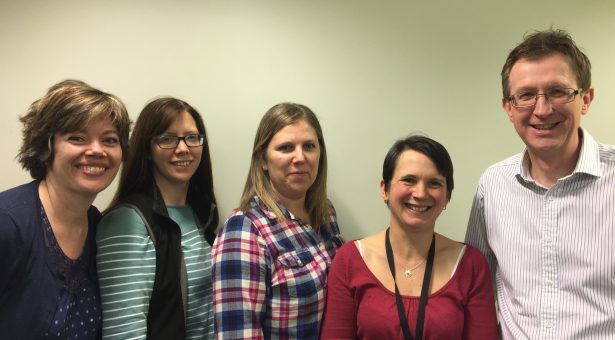Introducing the Knowledge Exchange and Commercialisation team

Our plant and microbial science delivers social and economic impact that align with BBSRC’s strategic priorities for; agriculture and food security, industrial biotechnology and bioenergy and bioscience for health.
It is the job of our Knowledge Exchange and Commercialisation team to enable that work and the scientists doing it, to ensure that we achieve the maximum benefits for society, the UK economy and to constructively inform policy.
A recent example of these kinds of collaborations came from work the Dr Chris Ridout lab did with CN Seeds in investigating downy mildew resistance in baby leaf kale.
CN Seeds contacted the John Innes Centre, for our help in combating this issue. Following initial discussions with Head of Business Development Dr Jon Clarke, CN Seeds were put in touch with Dr Chris Ridout.
Dr Ridout hosted CN Seeds plant breeder Sujit Tha in his laboratory and shared techniques for screening varieties of baby leaf kale to find the one most resistant to the downy mildew disease.
Dr Ridout explains; “they need downy mildew resistance because that is the number one disease affecting baby leaf kale”, as such plant breeder Sujit Tha adds; “there is a huge commercial benefit to CN Seeds if together we can find a variety of baby leaf kale that is resistant to downy mildew”.
However, “not all scientific impact is commercial” cautions Jon.
“While part of our role is to help commercialise the work that is done here, a bigger part is helping to realise the other impacts our science can have, including broad societal health, environmental and educational improvements, down to things that touch on people’s everyday lives such as the nutrition of their bread.”
“Often scientists can get bogged down in trying to find the commercial angle of their research to unlock that next piece of vital funding. We can apply a different perspective to that discussion. The work you’re doing may not have an immediate commercial outlet, but does it solve a different problem, or can it help progress the work of a different area of research?”
Teresa Penfield continues; “Think of the Knowledge Exchange and Commercialisation team as a bridge between the lab and industry, government or education.”
“Our job is to help scientists at the JIC deliver the impact that they are interested. This might be by providing funding to support early stage project development, by identifying and approaching new contacts which are useful to developing impact from research and by supporting some of the legal processes necessary to protect their science”.
Karen Rushmer continues; “the work I do is often also about establishing and cultivating relationships, and specifically assisting scientists to make the best use of any financial grant funding available. With the recent FTMA (Flexible Talent Mobility Account), we helped six early career scientists to spend time in either industry or research via a series of three-month interchange placements.
“With the FTMA funding, Postdoctoral scientists who were planning their next step (a concern expressed by Jodi Lilley in her piece discussing her work in international development – link) could come to us to see if such ‘work placements’ were possible. From the very beginning of the application stage, we can work out who to introduce them to and what relevant projects might be going on, hence broadening their horizons and experiences, and enabling them to take the next steps.”
The team were keen to stress that they are always looking for new contacts, both in industries such as plant breeding, pharma or agritech, and new ideas.
As Jon stresses; “No idea is a bad idea. Get in touch and tell us what your problem is, or what you might want to do next and let us help you realise that dream”.
